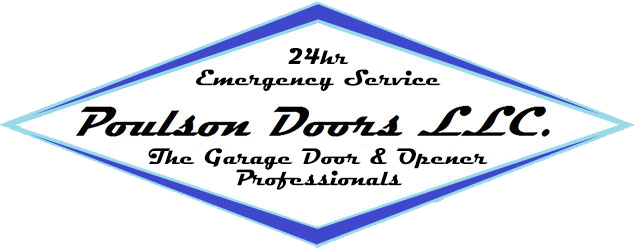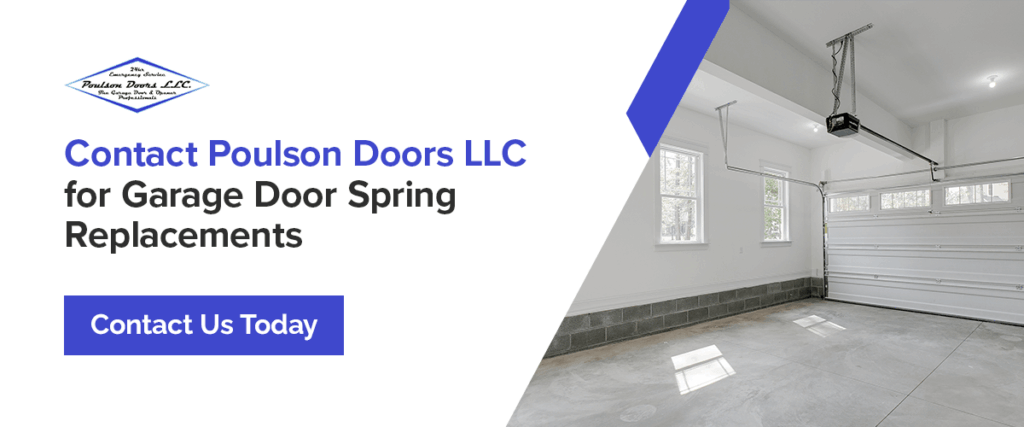Garage door springs enable your door to open and close smoothly multiple times daily. All that work takes its toll, so maintenance is necessary. Keeping garage door springs in good condition through regular maintenance can extend their lifespan and ensure your garage door is reliable, so you can get on with life and avoid costly repairs later.
Why You Need to Maintain Your Garage Door Springs
Your garage door’s springs are responsible for balancing the weight and ensuring proper door tension so it can operate smoothly. Maintaining your garage door springs helps avoid damage from wear, prevents premature replacement, and limits pressure on your opener.
Garage door spring maintenance also helps prevent damage and injury. Since garage door springs are under a lot of pressure, a sudden break or failure can cause the door to fall or become stuck.
Common causes of garage door springs failing include:
- Wear and tear: Springs weaken over time with repeated use.
- Lack of lubrication: Dry springs experience more friction, leading to faster wear.
- Rust and corrosion: Exposure to moisture causes rust, which weakens the metal and causes friction.
- Improper spring size or type: Using the wrong spring type for your door can cause premature failure.
- Sudden temperature changes: Extreme hot or cold weather can affect the spring’s flexibility, causing the metal to crack or break.
How to Maintain Your Garage Door Springs
Here’s how you can keep your garage door springs in good condition with proper maintenance:
- Regular visual inspections: Check the springs for gaps, rust or signs of wear. Also, check for loose, frayed cables connected to the springs.
- Spring tension tests: With the opener disconnected, manually lift the door halfway. If it moves on its own, the springs might need adjustment. If it stays in place, the tension is correct.
- Spring lubrication: Use a high-quality garage door lubricant every three to six months to keep the springs moving smoothly.
- Spring cleaning: Wipe away dust, dirt and debris and ensure the area around the springs is clear of obstructions that could disrupt movement.
Important to note: Never come in contact with the spring. It can snap or release suddenly, causing serious injury.
For door maintenance or cleaning, always check the owner’s manual and read all warning labels. Never use brake cleaner, as it is harmful and can ruin the paint.
How to Properly Lubricate Garage Door Springs
Follow these steps to properly lubricate the springs:
- Prep the door: Inspect the hinges and rollers. If they are covered in grime, clean them with a cloth and a silicone-based lubricant. Allow it to dry.
- Identify the type of spring: Torsion springs have a single spring above the door. Extension springs are on either side of the door.
- Apply lubrication to springs: If lubricating a torsion spring, spray the garage spring lubricant along its length. For extension springs, apply lubricant to the pulleys.
What to Spray on Garage Door Springs
Before lubricating, you must decide on the best lubricant for garage door springs. Avoid WD-40 because it can attract dust and dirt, causing more harm than good. Instead, use a silicone or lithium grease-based lubricant.
Lubrication Tips
- Disconnect the opener first: Make sure to disconnect your opener before applying the lubricant to the springs to avoid injury.
- Repeatedly open and close: Work the lubricant into the moving parts by operating the door several times. If you hear grinding or squeaking, you might need to apply more lubricant.
- Avoid over-lubricating: Excess lubrication attracts and traps dirt, which can damage the springs. Wipe excess lubrication with a clean cloth.
How to Identify Worn or Damaged Springs
Springs counterbalance the door’s weight — the door won’t stay in place without proper tension. Identifying worn and damaged springs quickly is essential to maintaining safety and the condition of your garage door. Here are some of the most common signs to look out for:
- Frequent need for adjustments: If you need to adjust your door’s position or tension frequently, the springs might be wearing out and losing their ability to hold the door’s weight.
- Difficulty opening or closing: If your garage door struggles or takes a long time to open or close smoothly, the springs could be worn or lose tension.
- Door falls or stops midway: If your door suddenly falls or stops halfway, it could be a spring failure.
- Crooked door movement: If one side of your garage door moves faster than the other, one of the springs might be damaged or broken, making the door unbalanced.
- Visible damage: Inspect the springs for visible damage, such as gaps in the spring coils, rust or corrosion. Any noticeable wear can weaken your spring’s ability to support the door.
- Unusual noises: A sudden loud bang or snapping sound could indicate a spring breaking. If you hear grinding or squeaking sounds, it indicates your springs need lubrication.
When to Call the Professionals
Listen for unusual noises like creaking, squeaking, or snapping when the door’s opening or closing. These could indicate the need for professional attention. Springs usually last 10,000 cycles — depending on how often you use your door, this could be 10 years or less. Even with regular garage door spring maintenance, it’s a good idea to have a professional inspect the springs annually. Professionals can detect hidden signs of wear, make necessary adjustments, and replace springs before they fail.
If you have a broken spring, don’t attempt to replace it yourself. Springs are tightly wound and can cause serious injuries. It’s best to call in the garage door and opener professionals at Poulson Doors LLC to prevent serious door damage and minimize pressure on your opener. Calling our experienced technicians to attend to your springs can also reduce the risk of high garage door spring repair costs.
Contact Poulson Doors LLC for Garage Door Spring Replacements
If your garage door springs are worn or damaged, don’t wait for them to worsen. At Poulson Doors LLC, we specialize in safe and professional spring replacements, ensuring your garage door operates quietly and reliably. Our team has the expertise and equipment to handle spring replacements fast and efficiently, preventing potential damage to your door and safety hazards. Contact us today to request service or get a free quote to keep your garage door running like new.


